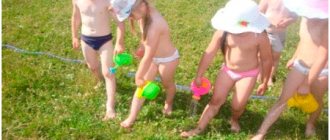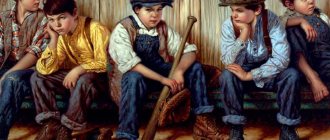What is the intellectual development of a child?
Today, teachers and psychologists are in constant debate about what intellectual development is. But in one thing they are similar and by this term they mean a certain amount of skills and knowledge, or rather the ability to assimilate the same knowledge and be able to solve non-standard situations. It is also necessary to understand that the child’s intellectual development is not predetermined, i.e. it can be slowed down or accelerated, and even stopped at some stage (all this will depend on the circumstances). Therefore, if you have a certain interest in the intellectual development of your children, then you should direct their desire to learn almost everything about the world around them and their irrepressible energy in a constructive direction. After all, children are very active and inquisitive and surprisingly quickly grasp interesting information that is new to them. The mental development of a child , first of all, begins in the family: with simple games and fairy tales told to him at night. It is through a fairy tale, fantasy, play and children's creativity that you can reach not only the heart of a child, but also the desired intellect. And in this case, the fairy tale will act both as entertainment and as a certain stage in the education and development of children . This is how a child’s acquaintance with the world around him and the world of human relationships begins with a fairy tale. Through a fairy tale, a child learns his place in this world, and also gets his first attempts to imagine good and evil, betrayal and friendship, cowardice and courage. Only a fairy tale can explain in an accessible form what is good or bad, whether the hero of a fairy tale is positive or negative. And sometimes parents underestimate the educational and developmental role of fairy tales in the development of children . And they forget that this is centuries-old folk wisdom. In addition, a fairy tale is not only an effective method for the development of children , but also a unique opportunity to create and maintain a trusting, close relationship with a child, not overshadowed by tedious and long lectures that evoke only negative emotions in children. A fairy tale awakens a child’s imagination and curiosity, develops intelligence, and helps to understand the emotions and desires of other people. Children don’t just listen to a fairy tale, they live it, become the heroes of the story and even try to overcome the obstacles that stand in their way.
The fairy tale fully takes into account all the age-related capabilities of a preschooler, because:
- fairy tale language is accessible to the child; -most often in a fairy tale there is an emphasis on figurative thinking, and the child digests the information unnoticed. In addition, the fairy tale provides logical development for children; - the emotional world of the baby is very close to the mood of the fairy tale. This is how talking animals appear in fairy tales. And the child understands this very much, since at this age he has no doubt that there are representatives of the world of living and inanimate nature and fairy-tale characters are also endowed with the same properties as the people around him, and he himself; -reading fairy tales is the best way to help your child instill a love for books.
How to make a fairy tale your baby's friend?
1. When choosing a book, do not forget: young children understand the text better and faster only based on the image. It is more advisable to purchase the first children's books with bright and clear pictures. 2. Read the same fairy tale to your child many times. The child asks to read his favorite book again and again. After all, when listening to a fairy tale, the child perceives the text partially, and what is missing is completed by the little dreamer. And then the same fairy tale appears before them differently each time. And over and over again, playing the role of their favorite fairy tale, children thus hone their personal qualities. 3. When reading once again, diversify your reading style: slower or faster, emotional or restrained; 4. After reading your favorite fairy tale, ask your child to make characters out of plasticine or draw an illustration. You can also play this fairy tale in a home theater or watch a film based on this work. This will allow the child to better understand the fairy tale and feel; 5. Particularly impressionable children should not read “scary” episodes and even highlight them with expressive reading. The comprehensive development of a child lies in the enormous potential of a fairy tale. And the more fully these fairy tale resources are used, the more interesting and brighter the children’s lives.
Tales with a recipe
Fairy tales, like medicine, must correspond to age and “indications”. If the baby is only two years old, then fairy tales about animals with repetitive actions and plots are suitable. In order for such a child to understand the content and be able to follow the events and characters, it is better to show bright illustrations in the book or play out the fairy tale on toys.
Around the age of three and a half, children acquire the skill of distinguishing fairy-tale life from reality. From this age on, you can immerse them in a fairy tale and identify with its heroes more boldly. From two to five years, the child develops imaginative ideas and imagination. In other words, the brain is preparing to perceive fairy tales.
Depending on what you want to instill in your child, choose fairy tales about greed - generosity ("The Tale of the Fisherman and the Fish", "Golden Antelope", "Frost"), about courage - cowardice ("About the Cowardly Hare"), about slobs and neat stories (“Moidodyr”, “Fedorino’s Mountain”), etc.
Developing intelligence
Experts are convinced that if you start learning a foreign language at an early age, the acquired knowledge will be absorbed much faster and more effectively. The learning process can also be played out with the help of fairy-tale characters, starting with the simplest words (hello, bye, how are you, and so on). In this case, the child must alternately pronounce the word in his native language and a foreign language, i.e. teach him the ability to switch. But it is worth remembering that if a child does not show desire and does not want (even through a fairy tale) to perceive a foreign language, then you should not force him, apparently he is not yet ready for this. Excessive imposition will also lead to nothing, but on the contrary, it will develop in the child a certain negativity towards this process, and will cause a reluctance to learn the language in the future. The development of children in preschool age is of great importance for their future future. Therefore, at this stage of development, the child must receive all the necessary components for a further full life. The child must be able to distinguish words. those. he must be in the process of developing sensitivity to words. For example, in the process of reading a fairy tale, a child must determine where the beautiful words are, sad, fairy-tale or affectionate. At the same time, he should develop the ability to compose long and funny words (fox - “red-tailed”, “fluffy-tailed”). Children should be taught to distinguish words that are identical in spelling, but different in meaning, and to use them correctly in each specific case. This will also contribute to the correct placement of stress in the word (flour-flour). Everyone knows the close connection between mental and speech activity. This should also be given due attention. You can use the game “Identify the extra word.” During which the child must summarize the information and select what is needed. For example, which of the heroes in a fairy tale is superfluous, or to determine who does not fit a certain group of words (dog, fox, rooster, hut, hare, and so on).
Parents, know that it is in fairy tales that you can find material that will help your children become more confident, patient, learn to listen and accept inconsistency. After all, a fairy tale is food for the subconscious. But words tend to be forgotten, but the sensations remain.
And never forget that the main condition for the development of a child’s intellectual abilities is to receive pleasure and joy from the process of learning. If a child performs certain tasks out of obedience, a desire to receive a reward, or out of fear, then of course he will learn this knowledge, but this will not have anything to do with his abilities.
PS Tests to determine the intellectual development of children give only a general picture: whether your child corresponds to the mental development of his age. After all, every child is a little unique person, and if there are any problems in solving specific problems, or a minimal lag, then everything can be solved, and this can be corrected.
The benefits of fairy tales for children
“Don’t be afraid of a fairy tale, be afraid of a lie, but a fairy tale, a fairy tale will not deceive. Tell a fairy tale quietly, there will be more truth in the world.” These are the words of a wonderful song from “Kuzi the Little Brownie”. Remember? We all come from childhood. There is hardly a single person among us who has not listened to fairy tales. We all remember the very first fairy tales about Kolobok, Turnip and Chicken Ryaba, we remember the fairy tales about Thumbelina, the Snow Queen and Puss in Boots.
Each of us worried about the main character and dreamed of a handsome prince or a goldfish that fulfills all wishes. Each of us had a favorite fairy tale that we asked to read 1000 times, and each time it opened up for us from a new side. Why do we and our children love fairy tales so much? What are the benefits of fairy tales?
The fairy tales that we love so much are not just fictions that are interesting to us and our children. These are fascinating stories that fascinate, drawing you into magical kingdoms along with fairy-tale characters. Children take fairy tales as a matter of course, which does not cause any discussion or criticism.
Returning to the times of our ancestors, one can notice that when a child committed some kind of offense, they were in no hurry to punish him physically, but always “started a story”, guiding him on the true path. After which the child himself could comprehend his behavior and draw conclusions so as not to repeat what he had done. A fairy tale is a very good method of raising and teaching children - you can even start teaching your child to read syllable by syllable. By telling fairy tales to our kids, we pass on to them our experience and the experience of our ancestors.
Through a fairy tale, a child enriches his inner spiritual world, gets rid of worries and fears, gains knowledge about life and its laws, develops imagination and creativity, learns to empathize and anticipate events. Thanks to a fairy tale, a child can play out negative roles and feelings without being punished. Fairy tales are very good at separating the idea of male and female behavior.
If you carefully read fairy tales, you will notice that the main character is always active, he is brave and always emerges victorious, he makes every effort to solve the problem. Fairy tales teach a child to act actively and not to give in to difficulties. Magical children's fairy tales teach the child that good always triumphs over evil, and behind the black stripe there will always be a white one. It gives the child new sensations and impressions.
Oddly enough, you also need to be able to read fairy tales. It is better to set aside a separate time for reading a fairy tale, for example, before bed. It’s great if you read it with expression, highlighting the climactic moments intonation. You need to read slowly, quietly, pronouncing all the words clearly. By following these recommendations, you will help your child develop correct speech, and in the future he will speak clearly and beautifully. If possible, read fairy tales in the original version, rather than modern shortened and simplified versions.
If you don't have enough time, you can use the audio option. This way, the children will listen and you can do a couple of things at the same time, being close to the children.
Try to read only one fairy tale at a time, so your child can understand its meaning more deeply. Never refuse to read your child’s favorite fairy tale, even if it’s the thousandth time. If a child constantly asks her to read, it means it is important for him, he is trying to get some kind of internal answer or is experiencing and replaying some life situation. The benefits of fairy tales are priceless.









